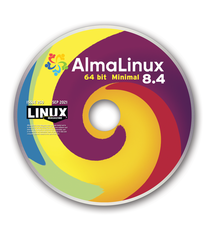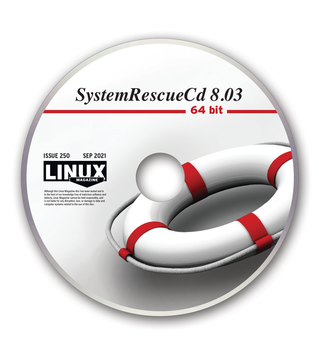On the DVD
On the DVD

AlmaLinux Minimal 8.4 and SystemRescueCD 8.03
AlmaLinux Minimal 8.4 (64-bit)
After three decades of Linux, you might think there are no reasons for a new distribution. In the case of AlmaLinux, however, you would be wrong. First released on March 30, 2021, AlmaLinux is intended as a replacement for CentOS, the popular Fedora derivative.
Why a replacement for CentOS was necessary is a complicated story. Essentially, it dates to Red Hat's acquisition of CentOS in 2014. Since the acquisition, the relationship between CentOS and Red Hat Enterprise Linux has been uncertain. The uncertainty reached a climax in January 2021 when Red Hat announced without discussion that development of CentOS would be discontinued by the end of 2021, except for the upstream CentOS Stream. Reactions were partisan, but some concerns were also practical: CentOS is most often installed as a server, and sys admins were abruptly left without an upgrade path. The solution was two forks of CentOS – Rocky Mountain Linux and AlmaLinux.
AlmaLinux quickly formed the AlmaLinux Foundation to ensure ongoing support for its project. A major partner in the foundation is CloudLinux, which is likely to have a major influence on the future development of AlmaLinux. Meanwhile, AlmaLinux has promised to support the newly released AlmaLinux 8.x releases until at least 2029 (the numbering continues on from the CentOS numbering).
If you are curious about how AlmaLinux continues CentOS in other ways, this month's DVD gives you a chance to explore AlmaLinux Minimal 8.4.
SystemRescueCD 8.03 (64-bit)
As the name implies, SystemRescueCD is not a distribution for daily use. Rather, it is a bootable disk that you can install on a DVD or flash drive for use when troubleshooting or repairing a system. It includes an impressive array of command-line tools, including standard editors, the Midnight Commander file manager, the GParted filesystem, network filesystems such as Samba and NFS, and many more too numerous to list. In addition, its kernel supports numerous filesystems, including ext4, XFS, Btrfs, VFAT, and NTFS.
You will not need SystemRescueCD every day, but you should consider keeping a current copy nearby and checking periodically that it still works. If you run into trouble, you'll be glad you took the time. And one more thing: Because it is a Live system, SystemRescueCD can help you manage Windows machines as well.
Buy this article as PDF
(incl. VAT)
Buy Linux Magazine
Subscribe to our Linux Newsletters
Find Linux and Open Source Jobs
Subscribe to our ADMIN Newsletters
Support Our Work
Linux Magazine content is made possible with support from readers like you. Please consider contributing when you’ve found an article to be beneficial.

News
-
Systemd Fixes Bug While Facing New Challenger in GNU Shepherd
The systemd developers have fixed a really nasty bug amid the release of the new GNU Shepherd init system.
-
AlmaLinux 10.0 Beta Released
The AlmaLinux OS Foundation has announced the availability of AlmaLinux 10.0 Beta ("Purple Lion") for all supported devices with significant changes.
-
Gnome 47.2 Now Available
Gnome 47.2 is now available for general use but don't expect much in the way of newness, as this is all about improvements and bug fixes.
-
Latest Cinnamon Desktop Releases with a Bold New Look
Just in time for the holidays, the developer of the Cinnamon desktop has shipped a new release to help spice up your eggnog with new features and a new look.
-
Armbian 24.11 Released with Expanded Hardware Support
If you've been waiting for Armbian to support OrangePi 5 Max and Radxa ROCK 5B+, the wait is over.
-
SUSE Renames Several Products for Better Name Recognition
SUSE has been a very powerful player in the European market, but it knows it must branch out to gain serious traction. Will a name change do the trick?
-
ESET Discovers New Linux Malware
WolfsBane is an all-in-one malware that has hit the Linux operating system and includes a dropper, a launcher, and a backdoor.
-
New Linux Kernel Patch Allows Forcing a CPU Mitigation
Even when CPU mitigations can consume precious CPU cycles, it might not be a bad idea to allow users to enable them, even if your machine isn't vulnerable.
-
Red Hat Enterprise Linux 9.5 Released
Notify your friends, loved ones, and colleagues that the latest version of RHEL is available with plenty of enhancements.
-
Linux Sees Massive Performance Increase from a Single Line of Code
With one line of code, Intel was able to increase the performance of the Linux kernel by 4,000 percent.


